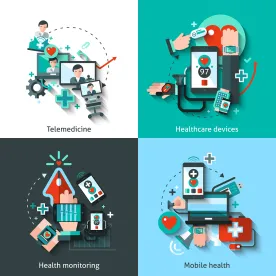In the second of a three-part series, we consider some additional key questions that companies across the life sciences, technology, and communications industries should be asking as they seek to fit together the regulatory and commercial pieces of the complex digital health puzzle.
Key Commercial Questions When Contracting for Digital Health Solutions
1. Will you own or have rights to use the data that is collected and generated, and any insights, models, and algorithms that are developed?
If, as part of your digital health business model, you are partnering with a provider of big data analytics services (for example to develop therapeutic models to then incorporate into an app), you should ensure that you, your business partners, and any other third parties who are necessary for the implementation of that model, are permitted to use the output data to the extent needed. This requires careful attention to the data terms in your contract with the provider as well as appropriate due diligence of the terms under which the input data were obtained, which may limit downstream use of that output data.
The data outputs from data analytics conducted in digital health projects may represent new “insights.” For example, these insights could relate to the effectiveness of different treatments, comparative outcomes achieved with different delivery models, or predictive models for diagnosing, treating, and delivering care. Securing ownership of these insights and intellectual property rights in these insights can be difficult. First, under various legal systems, it may not be possible for the insights to be “owned” as such, and patent, copyright, or trade secret protection may not be available or viable. Secondly, there may be competing ownership interests among the collaboration partners. For example, if your data scientists discover an insight using your own proprietary algorithms, but those algorithms were applied to patient data and rely on advanced analytics tools provided by a service provider’s data processing platform, should the owner of the insight be you, the source of the data (e.g., a hospital), or the service provider?
In addition, competition authorities, particularly in Europe, are increasingly focusing on the circumstances in which data, including output data, can confer an anti-competitive advantage. Recent cases and statements from certain European competition authorities suggest that there may be a risk that entities controlling output data that (a) cannot be replicated (or obtained from another source), (b) is necessary for the development of new products, and (c) will not quickly become outdated, may be required to provide access to third parties developing such new products.(1)
2. Do you have commitments from your suppliers to provide functions at service levels suitable for the health sector and designed to maintain patient/user trust?
If you are responsible for delivering a digital health service to customers, it is critical for that service to be provided in accordance with service levels that are suitable for the health sector and that are designed to build and maintain patient/user trust.
Service components such as availability of user support, call response times, “uptimes”/permissible downtimes, and problem resolution time frames will all typically be governed by service level arrangements between you and your customers, and between you and your suppliers. If one or more components of the digital health service are supplied to you, or on your behalf, by third party sub-contractors, then you will want to ensure that you have in place with those sub-contractors appropriately robust service level arrangements. These will need to be sufficient to ensure that you can provide to your customers the level of service for the overall digital health service that they expect and that will maintain your competitiveness in the market.
Prior to contracting, you should carry out due diligence of your potential suppliers to determine whether they are in turn dependent on other suppliers (for example a cloud storage platform provider), and if so, whether the service levels at each link in the chain are adequate having regard to customer expectations.
3. When you are structuring strategic collaborations to develop and deliver a digital health service, have you taken into account uncertainties as to the ultimate composition of the service, its customers, and its reimbursement model?
If you are entering into strategic, long-term collaborations to develop and market a digital health service, a significant challenge is that it is often unclear at the outset what the precise route to market will be, including who, in principle, will be the customer. It is often similarly unclear what all the elements of the resulting service will ultimately be, and so it is not possible to determine the cost of providing the service until a later stage in the collaboration. Further, the reimbursement model may initially be uncertain and your collaboration partners might desire to conduct one or more pilot phases with healthcare providers in order to demonstrate the service’s value proposition and refine a reimbursement model.
As a result, you must consider whether you wish to agree to financial terms at the outset or at a later stage in the course of the collaboration. Agreeing to financial terms at the outset has the benefit of certainty, but there is a risk that those terms become inappropriate or uneconomical in the event that the underlying basis for the financial terms changes. On the other hand, deferring agreement of the financial terms to a point at which there is more clarity ensures flexibility, but it will be essential for you and your collaboration partners to work through, and document, the consequences of failing to reach agreement at that later stage. For example, you will likely have invested considerably in the collaboration prior to that point, and may have a third party such as a healthcare system looking to move from a pilot phase to full commercial implementation.
-
See, for example, Facebook/WhatsApp Case N.7217; Keynote speech, G. Loriot, 7 June 2017, GCR Live 6th Annual Telecoms, Media & Technology conference.







 />i
/>i
